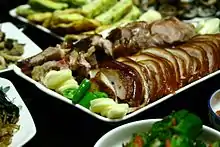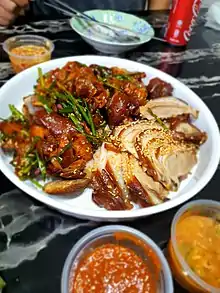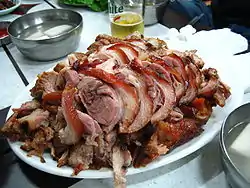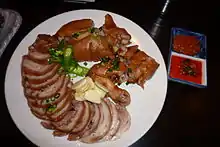Jokbal
Jokbal(족발) is a Korean dish consisting of pig's trotters cooked with soy sauce and spices.[1] It is usually braised in a combination of soy sauce, ginger, garlic, and rice wine.[2] Additional ingredients used can include onion, leeks, garlic, cinnamon and black pepper.[3]
| Jokbal | |
 Sliced jokbal, a popular dish served as anju in South Korea | |
| Korean name | |
|---|---|
| Hangul | 족발 |
| Hanja | 足발 |
| Revised Romanization | Jokbal |
| McCune–Reischauer | Chokpal |
Preparation
The hair is removed from the trotters and they are thoroughly washed. Scallions, garlic, ginger, cheongju (rice wine) and water are brought to a boil. The trotters are added, brought back to a boil and then simmered until tender. After this, additional measures of water, sugar and soy sauce are poured into the pot, and the contents are slowly stirred. Once the trotters are fully cooked, they are de-boned and cut into thick slices. They are then served with a fermented shrimp sauce called saeujeot, cloves of raw peeled garlic, and spicy peppers.[1]
Serving

As jokbal is a dish usually shared by several people, it is generally served in large portions, and as it is greasy and has a strong flavour, Korean diners often eat it as ssam, wrapped in a piece of lettuce with sauces and other vegetables. Jokbal is considered an anju, and thus is often accompanied with soju. Restaurants serving jokbal frequently offer both a regular and a spicy version of the dish, with especially spicy versions being dubbed buljokbal—literally "fire jokbal". Most also offer other variations, including Busan-style naengchae jokbal, which is served cold and garnished with chilled vegetables.
Nutrition
Jokbal contains a lot of gelatin, and is thus said to promote firm, wrinkle-free skin. The amino acid methionine, found in pork, is claimed to counteract the effects of alcohol and to prevent hangovers. Korean sources also attribute numerous other beneficial effects to pork products like jokbal.[1]
Jokbal Street
The area around Dongguk University Station in Jangchung-dong, Seoul is known for its numerous jokbal restaurants. The restaurants have long histories, some having been open for as many as 50 years, and all claim to be the "original" jokbal restaurant.[4] Most of the restaurants have opened franchises throughout the country and offer delivery services.[5][6]
Gallery
 Jokbal at a vendor in Namdaemun Market
Jokbal at a vendor in Namdaemun Market Jokbal at Korean Town in Osaka, Japan
Jokbal at Korean Town in Osaka, Japan Jokbal
Jokbal Jokbal
Jokbal On a plate with sauces to the right
On a plate with sauces to the right Jokbal 2013
Jokbal 2013
See also
References
- (in Korean) Jokbal at Doosan Encyclopedia
- Jung, Alex "5 Korean ways to eat a pig" Archived 2011-11-13 at the Wayback Machine CNN Go. 11 November 2011. Retrieved 2012-04-11
- Gentile, Dan (February 28, 2014). "Korean food: The 12 essential dishes you need to know from the North and the South". Thrillist. Retrieved May 19, 2017.
- "Jangchung-dong Jokbal Street". Korea Tourism Organisation. Retrieved 2016-06-27.
- (in Korean) Nighttime snacks popular, Asia Today, 2010-05-31. Retrieved 2010-06-30.
- (in Korean) Jangchung jokbal chains Archived 2012-02-24 at the Wayback Machine, Hankyung, 2009-04-22. Retrieved 2010-06-30.
External links
| Wikimedia Commons has media related to Jokbal. |
- Jangchung-dong Jokbal Street, Korea Tourism Organization
- The story of food: Jokbal
